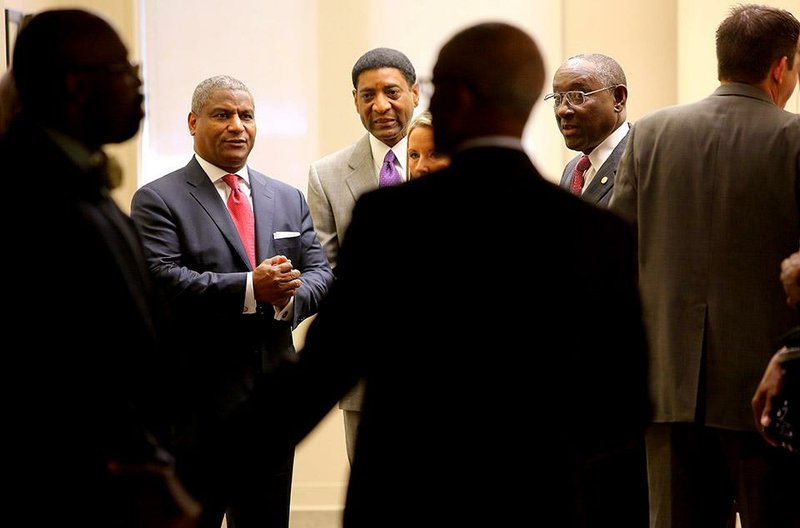Panelists participating in a discussion of transportation and logistics hosted by Philander Smith College on Tuesday said students at the predominantly black college should consider the sector as a career.
Ron Mathieu, the executive director of Bill and Hillary Clinton National Airport/Adams Field, noted that less than 1 percent of the nation's 501 commercial aviation airports are run by black executives.
"The opportunity is there if you are bold, committed and resilient," said Mathieu, a member of the panel who is black and has run the state's largest airport since 2008.
About 80 students and faculty members attended the panel discussion that included Rodney Slater, a Marianna native and former Arkansas Highway Commission chairman who went on to head the Federal Highway Administration and the U.S. Department of Transportation under President Bill Clinton.
"Transportation is more than concrete, asphalt and steel," he said. "It is about justice. There is very little diversity in this area. If you aren't at the table, how can you be part of the discussion?"
Other panelists included Antoine Ajarrista, senior vice president and general manager of Dassault Falcon Jet; Kristi Crum, a regional president for Verizon Wireless; Bryan Day, executive director of the Little Rock Port Authority; and Sandy Otto, Arkansas division administrator for the Federal Highway Administration.
The panel was moderated by Terry Esper, an associate professor in the supply chain management department in the Sam Walton College of Business at the University of Arkansas in Fayetteville. He is a 1986 graduate of Philander Smith.
Esper told the audience that transportation affects everyone, even those who don't drive a car or fly on airliner.
"Everything we are wearing, everything we consume has been transported," he said. "That stuff had to be moved for me to be able to purchase it."
The equivalent of $497 billion worth of commerce takes place every day in transportation, added Crum. "That's impactful."
Much of the commerce is reflected in increased heavy truck traffic. The interstates were originally designed with truck traffic accounting for about 10 percent of the traffic it carries every day, Otto said; on interstates around Memphis, the percentage of truck traffic is about 60 percent, she said.
"We have the expectation that products are to be delivered today or tomorrow," Day said.
At the same time, Mathieu said, the technology on which transportation systems rely remains fragile. He said that was illustrated by a fire on Friday at an air traffic control center in Chicago that disrupted thousands of flights, the effects of which are expected to continue for days.
Still, continued technological innovations in both transportation and communications are set to transform the sector, Crum said.
They include not only driverless cars that will allow more efficient movement of traffic, but aerial drones that could deliver products to homes, according to the panelists.
It is one thing to develop the driverless car or drone, but they still have to be integrated into the larger transportation system and with each other, which presents opportunities for students of today, Ajarrista said.
Otto, an engineer by training, said students don't have to study engineering to seek careers in transportation. Her office, for instance, has transportation planners, environmentalists and budget analysts to help monitor the spending of federal transportation dollars in Arkansas.
Metro on 10/01/2014
